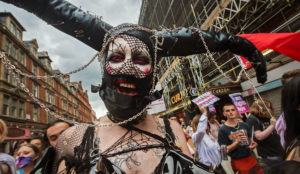It was a feminist bookstore that led me to the Women’s Liberation Movement. I was a shy 17-year-old, in Leeds, in 1979. I nervously opened the door of the shabby shop front, which had posters of Audre Lorde and Kate Millett in the window. Inside, a noticeboard advertised rooms in squats and co-ops, and information about social and political gatherings. Feminist groups would often meet there after closing time: we planned the revolution in the back rooms, surrounded by dusty second-hand novels and placards from Reclaim the Night demonstrations.
It was the same in many towns and cities. During the early days of second-wave feminism, in the late Sixties and throughout the Seventies, women’s libraries cropped up, usually housed in the corner of an alternative bookstore. The first one in North America, Minneapolis’s Amazon Bookstore, opened in 1970 on the porch of a commune. At one time, there were over 150 feminist libraries on the continent, mostly run by volunteers, providing resources key to the movement. Today, partly because of a different kind of Amazon, they have almost all closed down.
One feminist library that has survived and thrived is London’s. Founded in 1975, for decades it has been a valuable resource for historians, social scientists, journalists and, most importantly, young feminists who wish to learn their history. Countless women have benefitted from it. I myself have spent days there, digging up details of old campaigns for articles and research projects.
But now, it is threatened — by people who call themselves feminists but are in fact the opposite. Four years ago, the library trustees — all older feminists who had been involved for many years — decided to expand the collective and actively recruit young women to join. Unfortunately, many of those who came forward were hostile to the type of feminism that prioritises women, which was soon displaced by trans activism.
An early sign that things were going wrong came in September 2019. The Feminist Library declined to offer a stall to FiLiA — a female-led, feminist organisation that hosts an annual international conference for women — at one of their events. FiLiA was told that the library’s new “Community Policy” would not allow FiLiA on their premises. It’s worth mentioning, here, that FiLiA has made it clear that women — and women-only spaces — come first in the feminist movement, and the organisation has been vocal in public and on its website about its rejection of extreme transgender ideology.
Then on the 28th January 2021, the Library published a statement on transphobia and accountability. Among a load of virtue-signalling waffle, the statement resolved “not to feature trans-exclusionary groups on our panels or other events at the Library or allow them to book the Library for their own events”. Despite the tradition of the library being women-only, this meant that those who believe in women-only spaces, and sex-based rights, were banned from accessing books and collections. Today, women have even been stopped from meeting on library premises if they don’t believe that “trans women are women”.
The library is now run by women hostile to feminists. Lola Olufemi, who was appointed Volunteer Coordinator at the end of 2019, was instrumental in de-platforming the historian Selina Todd at the 50th Anniversary of the first Women’s Liberation conference in February 2020 — an event that Todd helped organise. That same month, FiLiA attempted to open a dialogue with the Library, asking them for a meeting and voicing the concerns of their members. They felt the trustees should be ensuring the resource was available to those who need it; feminist librarians should not be excluding women.
“The biggest trick that patriarchy pulled is to put distance and barriers between women and to destroy the possibility of solidarity,” Lisa Marie Taylor, CEO of FiLiA, told me. “The new guard at the Feminist Library are doing this. They are blocking women from accessing our history and our language. They are literally stealing our words from us, and there’s no accountability. After 47 years, I’m sad to say that it is at existential risk.”
The library has responded to some of the many letters of complaint they have received from feminists, but very curtly. There has been no meaningful engagement with criticism. They have also issued a statement, saying that they are going to “review” their collections. What does this mean for the books, the textiles, the historic items in their care? Will anything that doesn’t conform to the ideas of trans activists be put under lock and key in the Restricted Section? Or worse, thrown away?
London’s is not the only feminist library threatened by trans activists. In February 2017, the Vancouver Women’s Library opened its doors. The city has a vibrant feminist movement, which mainly focuses on campaigns to end male violence. At its opening event, women gathered to celebrate. They were met by very aggressive protesters who tried to block them from entering the building.
The crowd included several men identifying as trans women or “sex workers”, shouting things like, “Take SWERF and TERF books off the shelf”. Red wine was thrown over the feminist posters on the walls. The protesters began lighting cigarettes in the non-smoking building and accused women of “violence” for the crime of running a feminist library. Books were damaged, items were stolen, and the fire alarm pulled. The volunteers had to pay $500 to the owner of the building. Despite all the hostility, those who wrecked the Vancouver Women’s Library claimed to be progressives. They were, in fact, misogynists.
The row that broke out at Glasgow Women’s Library in 2020 was less dramatic. Trans rights activists held a training day, led by two men, at the publicly-funded venue. They then published a statement saying that they only accept bookings from organisations and individuals that “align with our values”. Those values, of course, allow men to invade women’s spaces: the Library subsequently refused access to a women’s group for the crime of thinking that men can’t become women.
Claire Heuchan, a feminist writer and Chair of the Labrys Lit lesbian book group, volunteered with the Glasgow library for five years. Her love for the institution was evident when we spoke. “Libraries foster campaigns outside of the library and it is a connection to past campaigns too, so women don’t need to reinvent the wheel in their activism. Reading women’s stories and theories freed me from the pale, male stale curriculum I learned about in school, and led me to celebrate women’s voices. And it was for free.”
But it would appear that a number of feminists that used to be regulars at the library no longer feel welcome. As Linda (I’ve changed her name) told me: “The library used to be a sanctuary, but I don’t feel comfortable going now since all the spaces advertised as women only are mixed-sex and many former friends have ostracised me for supporting single sex spaces for women.”
Fortunately, there are a number of women resisting this hijacking of feminist values. Bec Wonders is a currently a feminist researcher at the Glasgow School of Art and co-founder of Vancouver Women’s Library. She is horrified at the way that women are being excluded from our own movement. “It is so anti-intellectual, and blatantly insulting to the ability of women to think for ourselves. It goes against the aim of empowering women to make up our own minds.”
Like me, Bec sees feminist libraries as not just a passive place where knowledge is stored and catalogued, but also a space where plans are made. Bec has lost all hope for the Feminist Library in London. She suggested that women should be storing things at home: emails, online conversations, pamphlets, publications — all the things that women in 50 years’ time will want to see. “We all need to be archivists,” she says.
What a tragedy, though, that we can no longer trust a collective to store these resources. Any movement whose goal is the destruction of women’s spaces, including feminist libraries, is not feminism; it undermines everything feminism has built. Gail Chester, who is one of the library’s founders and remains a trustee, appears to have been ostracised by the new guard for being committed to women-only spaces and the literature produced by early pioneers of the movement. She is the only person involved in the library willing to provide a comment for this article.
“As a founder of the feminist library,” says Chester, “what I want is an anti-sectarian library that is accessible to everybody, where debate and dialogue are welcome, and where no feminist publications are censored.” It doesn’t seem much to ask.
Disclaimer
Some of the posts we share are controversial and we do not necessarily agree with them in the whole extend. Sometimes we agree with the content or part of it but we do not agree with the narration or language. Nevertheless we find them somehow interesting, valuable and/or informative or we share them, because we strongly believe in freedom of speech, free press and journalism. We strongly encourage you to have a critical approach to all the content, do your own research and analysis to build your own opinion.
We would be glad to have your feedback.
Source: UnHerd Read the original article here: https://unherd.com




